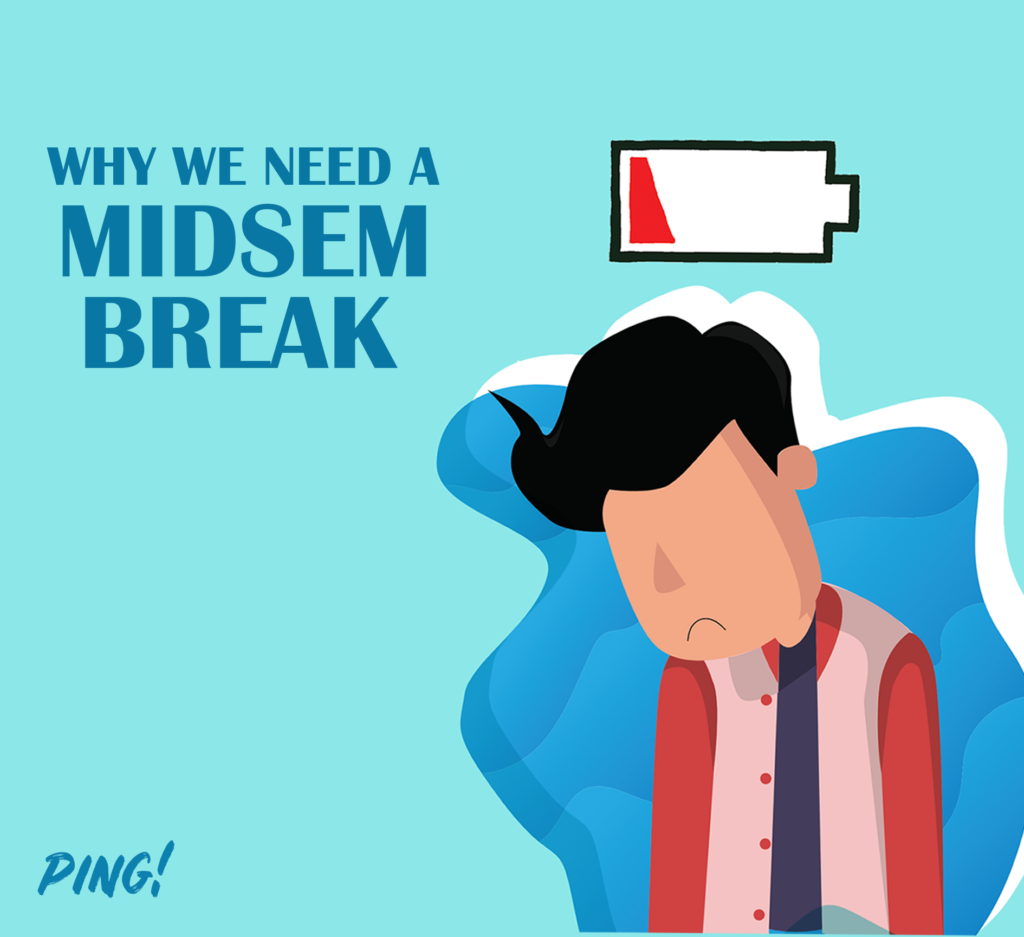The Case for a mid-sem break in the online semester(s?)

Introduction
Anecdotally, the online semester has been hard. For many, it has been more stressful than any other in recent memory. While no hard evidence has been collected as to why this is so (and how many people actually feel this way)[note]At the time of writing this, the Parliament has sent out the first in a pair of ‘FSIS forms’ for feedback on how the experience has been for students so far. The results of that will hopefully shed more light on the ground reality.[/note], we can try and reason out why such is the case. Moreover, we discuss how a week-long break can go some way in alleviating the situation and improving the experience for many
If you don’t want to read the wall of text that follows, the summary of the argument is as follows.
- Why the current semester is harder than earlier: there is much more work than usual, (in a first for most?) students are studying and doing assignments simultaneously, there are none of the usual ‘breaks’, the peer group is missing, some courses still aren’t adapted to the online mode of instruction, there are lots of deadlines to track over far too many platforms.
- How a break (an actual break, not a proxy for deadlines right after) can help: students can catch up without missing the next bit of work that is assigned every week, get research work done if they are so inclined, and otherwise students can simply take some time off and take a breather (aka a break) to ‘reset’ the cognitive load of the semester.
- The break alone is not enough to deal with all the problems of the online semester – worth an article in itself if we find the writers – but it can help nonetheless.
This article spends a lot of time explaining the sources of increased pressure. Many students reading this will not need to be convinced. Skip to how the break will help.
Disclaimer: The article will seemingly attack the concept of continuous evaluation at times. Personally, we do not disagree with the idea as a whole – the writers prefer it, in fact – but there are some flaws in how it has been implemented by some courses, leading to the complaints.
How (now) is more stressful than an Offline semester
There’s more work to do
In a regular offline semester, most people invariably only study a day or two before their exams and quizzes. The rest of the time is filled with either assignments and projects, or nothing[note]It is worth noting that “just assignments/projects” alone can lead to generally stressful experiences for many students in the regular semester, as has been evidenced by all the FSISes that have transpired in the past.[/note]. Currently, many subjects have weekly or fortnightly mini-evaluations, or weekly homework, or both, on top of major projects, assignments, and sometimes midsems too — essentially, people are putting a lot more regular work in and are continuously under pressure. Now, of course, in theory this is pedagogically better and one can argue that students should be studying regularly anyway[note]This is not necessarily the case. As an (admittedly informal) test run of a quiz-system by a professor showed, “Quizzes may be much better in theory, but some of that theory is lost when confronted by students showing normal human behaviour and not taking full advantage of the opportunity”. Regular study was not a necessary byproduct, as they noticed. Students went from cramming last day for one big midterm to cramming last minute for all the weekly quizzes, with perhaps less preparation than before as they expected to cram the lesser material much faster. This does not, of course, discount the other benefits that were found to manifest. Read the full article at https://scientistseessquirrel.wordpress.com/2020/04/21/from-one-big-midterm-to-weekly-quizzes-what-i-expected-and-what-actually-happened/[/note], but the sole point being raised here is that, in practice, students are more stressed now than they usually are – never mind what they ‘should be doing’
Even discounting the unfamiliarity to work, there is a lot of work. Consider the following moodle calendars for some UG3-4 students in the month of September (images taken with permission)
It should be mentioned that some of the submissions are trivial and 5-10 minutes of work at most, but even excluding those there are a ton left over. This isn’t even all of it. A lot of the deadlines are not on Moodle – they could be on Microsoft Teams, GitLab classrooms, GitHub classrooms, OpenEdx, Shiksha. Several deadlines are on the same day too, and hence not represented entirely in the calendar
Being at home makes it harder to do this work
In college there are dedicated spaces for work. These can be labs, workspaces, the library, or even just your desk in the room. However, at home it is rare to find such spaces. In an attempt to maintain seriousness and prevent disturbances, students generally tend to work within their rooms at home. This means there is no separation of the ‘work’ and ‘non-work’ spaces, and the student begins associating their own rooms as areas of stress and tiredness. There is now no place for them to unwind and refresh themselves, as they spend all their time immersed in this stressful environment. Clearly, this is extremely detrimental to both the health and productivity of the student.
In addition to the lack of separation, there is the issue of the home environment itself. Living at home comes with its own chores and responsibilities – regular meals, regular baths, laundry, exercise, etc. One may argue that these are found in college too, and they would be right, but what makes these different at home is the amount of time committed to them. For a lot of people, it is no longer an option to eat whenever they feel like, by ordering in or going to the canteen, or even walking to DLF at night. There is now the requirement of there being a meal ready at home, or even the synchronising of the members’ individual schedules to eat together. This turns meals from quick breaks or parallel processes into larger reserved blocks of time, where one cannot continue to work except under some extenuating circumstance. It is the same for other activities like baths and laundry, which need to be done at ‘reasonable’ hours, rather than any available time. Time is also taken up by other chores unique to home, like washing dishes, cleaning the house, watering plants, or parent-mandated exercise. And let’s not forget the ever-important ‘family time’. With so many commitments, where is the time for work?
Staying at home, while generally conducive to keeping ‘healthier bedtimes’[note]On that note it’s worth looking at why ‘unhealthy bedtimes’ are a prerequisite (for many people) to do well in college. Or maybe it’s just universally bad time management. Perhaps another article. Ping us if you’re interested.[/note], is a definite hindrance to productivity. When the average bedtime on campus is three hours after the average bedtime of the house, one gets used to having company even in the later hours. So staying up at home, knowing nobody else is awake, seems a lot more difficult; you tend to end your work earlier or even go to sleep, caught up in the inertia of the rest of the house. Of course, this doesn’t really affect when you wake up – that varies from person to person. But it does reduce the productive hours to mostly just those with daylight, which are already packed with work due to aforementioned reasons. As a result, the amount of time actually free is significantly lesser, and the day becomes increasingly more hectic for the student.
Semesters usually have some “breaks”. Not here.
During the usual on-campus semester, there are a number of informal “breaks” that students tend to take advantage of. These aren’t actual breaks, but the nature of the on-campus experience means that they can be considered such. Elaborating:
The first of these – ironically – is the midsem week (and just after). In itself the midsem week is as far as you can get from the imagination of a “break”. It is the one week where students actually study. Even those who did study throughout the semester have to spend some time on revision. But the key factor here is in how this is the one time when (with a few notable, much-disliked exceptions) there are no major assignments and project deadlines due within the week, or the week after.
For sincere students, it is immediately clear how this ends up a break – without assignments, and having studied all semester, all they need to do is mild revision – maybe an hour or two per day. Whereas for the regular student, we need to consider how the semester usually goes. Normally there are cycles of either doing assignments/nothing, or studying for the exam/quiz – rarely both at once. Currently due to continuous evaluation, they are being forced to do both simultaneously. For them it is not so much that they are ‘missing a break’ as it is ‘constant pain’
The more prominent example of a ‘mid-semester break’ is the odd weekend or two that many take off – maybe sacrificing a class or two – to go home. Again, not an actual break. Deadlines can end up at just this time, maybe a random evaluation was scheduled for that very Saturday on the Friday before. But (most often) that does not matter. Deadlines can be met earlier. TAs also understand the significance of this break and will reschedule. Home, as aforesaid, is (was) not a dedicated space of work and students treat it like the break it is (was) – until we moved to the Online Semester. For that reason it is not fair to claim that students could just ‘choose to make their own breaks’ the way they normally do by going home. They’re already at home, and it is the workplace now. Where would they go, the Hyatt Regency?
The peer group is missing
In addition, the act of ‘scheduling’ meetings with friends turns into a chore, where once you could simply walk into their rooms (or their desks in labs and other locations) and ask anything. Such virtual meetings become just additional commitments to keep up with, rather than passive events or reminders on seeing a friend.
Friends are an essential part of college life. They help keep you on track with your work – “There’s a deadline”, “Don’t forget the eval”, “Project’s due in a week” – and even make sure you do it, when they see you procrastinating. Having friends share courses with you can be incredibly motivating, and is in fact a major factor when choosing which courses to take. Most people are known to take courses just because they will have some company. This gives them support during submissions, and they have people to team up with for projects. Most importantly, they are the group you can study with and ask for help.
Now, while it is certainly true that one can have ‘video calls’ and ‘sit with’ friends while working/studying, it is also obvious that this is very different from actually having them present. Chats are workarounds, but some doubts need to be conveyed in person – what if something needs to be physically pointed out or demonstrated? In addition, the act of ‘scheduling’ meetings with friends turns into a chore, where once you could simply walk into their rooms (or their desks in labs and other locations) and ask anything. Such virtual meetings become just additional commitments to keep up with, rather than passive events or reminders on seeing a friend.
Study groups are the most valued part of having a friend in the same course. Discussions and doubt-clearing both become much more effortless. And for people who find studying alone difficult – just being in the same space, without even talking, is enough to increase their productivity. Studying over call, while possible, is a poor substitute, as well as insufficient for those who concentrate better in company. Not to mention that from a purely monetary perspective, it is an inefficient use of mobile/internet resources, especially for those with limited data plans or poor connectivity in their region.
Beyond just the practicality of having a peer group, there is also a psychological component. Peer groups have solidarity – whether they are doing well or struggling, it is comforting to know that even the people around you are facing the same things. At home, your family might also have their own commitments or challenges, but there is a disconnect between their feelings and your own; there is no empathy or commiseration, just sympathy (if that). But your peer group is guaranteed to understand exactly what you’re going through – they get what it’s like to have just an hour till the deadline and not be done; they know how you feel when you pray the TA accepts your plea for a deadline extension; they have been where you are, when you just need to get out of the room and take a break at the canteen. Whatever you’re facing, you can be sure that there are people around you who relate. It is this lack of solidarity which is most strongly felt at home.
How more stress comes from problems specific to the execution of the Online Semester
Poorly planned courses
It is evident that some courses have not adapted to the online semester well, and this is ruining the experience even with other courses that have adapted perfectly. How so?
Consider four courses that have reasonable but regular work, including lectures, quizzes, homework, well scheduled such that each can be done in time without interfering with the others. But a single course with continuous but major evaluative components requires a lot more work than can fit in the regular week – so the other ones suffer. That’s fine, it happens every so often anyway and can be recovered from. But it happens again. And again. The work does not even have to be hard, just significantly time-consuming and poorly timed – work given without any consideration for other courses also having regular evaluation.
Again, this is not unique to the online semester – but the impact is definitely more significant as all courses have shifted to regular evaluation schemes.
Too many platforms
With the novelty of the online semester, the professors were given the freedom to design their courses as they found convenient. Unfortunately for the students, the professors’ preferences did not always match up with their own. The case where this affects the students most is with regards to the platforms in use for the courses. Now, it is expected that many courses introduce some software specific to the subject and students are required to learn it; this is not the same as using multiple platforms.
Earlier, lectures were taken in person, and resources were submitted on Moodle. In some cases, the professor used a third-party platform for projects and the like, but the total number of platforms in use was pretty low and thus easily manageable. However, the ‘freedom’ of online courses is such that the professors all have different preferences for video recording and resource sharing. When each professor decides to use a different platform, it tends to add up to a lot. The common ones in this semester are Moodle, Microsoft Teams, Zoom, Shiksha, OpenEdx, GitLab classrooms, and GitHub classrooms – and for some courses, there are even more links to refer to. This means that instead of just two odd places to check for any work, students have to check upto ten of them. In addition to this number, they can’t even take advantage of a consolidated calendar of deadlines or notification system the way they can get from Moodle. When keeping track of all the course links is so much work, it’s no wonder that deadlines get missed by students – and all because of a single forgotten link.
How the break will help
First: what qualifies as a ‘break’, and why
We’ve said earlier that the break, if given, should not just become “a proxy for deadlines right after”. What that means is that it should be a period of time where a student can choose to do nothing and not immediately fall behind on coursework. It is all too possible, knowing the nature of college, that a bunch of deadlines will be scheduled for 2-3 days right after the break, making it more of a ‘time given off explicitly to work on said deadlines’ like regular college without the classes, and less ‘off-time’. Also knowing college, this is likely to happen for all courses, as all courses end up with work assigned on the assumption that no other course has work assigned at this time.
As for why we specify this expectation of no work: if deadlines are scheduled for right after, then the implicit assumption for the student is that they also need to be working for that week off – which is not the intention here. So if 10 days are given for an assignment, assigned 3 days before the break, it should be collected 7 days after the end of the break. Or better – don’t have any homework in this gap, as that avoids the ‘undue advantage’ given to the overachievers who would not take the time off.
For people who want to catch up
A break can help students who have fallen behind catch up. This might seem contradictory to the prior requirement (of no work to be expected in the break), but that really isn’t the case. The biggest problem of having to play catch-up all semester is that one is never completely caught up. In the rush to finish delayed work by some deadline you sacrifice time that could have gone into more work due in the coming days. Postpone studying for the SMAI quiz day after because today is a Compilers midsem, and you were not able to study for the midsem until now because of an IRE Project due the day before. It is a domino effect. It does not help that the fact that the student missed some deadline – that they have to ‘play catch-up’ in the first place – likely implies more deadlines will be similarly missed in the future, leading to an insurmountable cumulative pileup by the end of the semester. A week off with zero expectations of work allows for some breathing room, a ‘reset point’ as it may be.
This isn’t just about deadlines, either. Some time off can enhance the semester from the learning point-of-view: instead of just scraping by, students can now get a chance to actually sit down and understand what has been taught to them in the semester so far, picking up on the finer details they were unable to grasp while studying just for their examinations and living deadline-to-deadline.
For people who want to dedicate time to research
Research is a process which occurs parallel to coursework – this is true for both online and offline semesters. Still, like for other things, the home environment has not been conducive to making progress in one’s research. Typically, research was done in your lab, where the others present respected the silent and serious atmosphere. This made it easier to concentrate and focus on your own research work. Of course, there was also the advantage of being able to discuss any problems with labmates and even your advisor at the spur of the moment (as examined under the advantages of having a peer group). But finding such an environment at home is not easy in the least. With more pressure to do both coursework and housework, the lack of ‘immediate’ requirement puts research as low priority, and puts students behind on their planned benchmarks – and even possibly on work for conferences. Having a break would help alleviate this backlog. Without the distraction of other pending (more ‘immediate’) work, one could finally do a deep dive into their research and make some much needed progress. In addition, not having to rush would ensure well-founded and thorough work, instead of poor quality improvisations.
As a break (alien concept, I know)
Maybe – just maybe – the break can be just that. A break. Even for those who are caught up with all the work that has been given, fatigue is a thing. We have spoken of how the semester is harder than usual, and the various factors combining for the effect. With that, spread over 13 weeks in and out of a constant workload, people do tend to get tired and underperform – even if they do not ‘fall behind’ per se. Again: this assumes that learning is the name of the game here, and not competition with others.
Making it a week long also allows for many people to catch up first – within half a week or so – and then enjoy the rest of it as a break. They could even take the entire time off, and even that would be better despite the workload remaining the same[note]We cannot offer any studies to this exactly, and although intuition suggests it would be the case, intuition could be wrong. A paper does however study the effect of (short) breaks on productivity, and while not exactly what we are looking for, provides some leads to the impact of (long) breaks on equivalent productivity. Read it at: Beeftink, Flora, Wendelien Van Eerde, and Christel G. Rutte. “The effect of interruptions and breaks on insight and impasses: Do you need a break right now?.” Creativity Research Journal 20, no. 4 (2008): 358-364.[/note].
Conclusion?
A break is not the end-all solution to the problems of an online semester. A lot of things are yet to be resolved – the multitude of platforms, the frequency and intensity of work expected, the continued lack of peers, the poorly planned courses. All of this needs systemic change. Some of it cannot be made up for. But the case here is for a measure that can offset some of the negative impacts of the experience – and a break is exactly that.
Authors: Zubair Abid, Shelly Jain
Editor: Shashwat Goel

 We Are So Cooked
We Are So Cooked  Qu’ils mangent de la grenouille! (Let Them Eat Frogs!)
Qu’ils mangent de la grenouille! (Let Them Eat Frogs!)  Tale of Two Cheenties
Tale of Two Cheenties  Peace of mind.
Peace of mind.  Boats and Valorant
Boats and Valorant  Blessings
Blessings  Cleaning up the Mess?
Cleaning up the Mess?
2 thoughts on “The Case for a mid-sem break in the online semester(s?)”
Comments are closed.